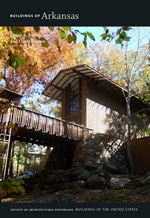Tucked away in deep woods on eighteen acres, Davidson Campground follows the typical southern hollow square arrangement for a rural camp meeting. Here ninety-one unpainted, rough frame cabins surround a rustic open-air tabernacle with a tall hipped roof where noon and evening services are held. For a week in late summer the campground springs to life, as it has since its founding in 1884, as hundreds of campers make the pilgrimage to Davidson drawn by an experience described as “part revival, part vacation, part reunion.” Great care is taken to preserve tradition. Worshipers still sit on the tabernacle’s rough benches, singing hymns, listening to sermons, and fanning themselves with cardboard fans. Their small two- or three-room cabins, which replaced the original tents, are still passed down within families and left unpainted and unscreened, with rudimentary kitchens and cots for beds. Visiting is conducted on the large porches, often in porch swings. All motorized vehicles are kept outside the circle. Concessions to modernity have been made: the Rural Electric Association (REA) brought in electricity in the 1940s, and three new bathhouses provide all the modern conveniences. In contrast to nineteenth-century campers who arrived from nearby communities in horse-drawn wagons laden with provisions (sometimes even the family cow), attendees today arrive from several states by car or motor home.
Methodism played a leading role in the revivalism that swept the American frontier in the late eighteenth century and became the leading denomination in Arkansas and the United States as a whole by the early 1840s. Methodism was especially successful in adapting to frontier conditions, its ministers reaching out to the uneducated and the unchurched, willing to preach in open fields or brush arbors in the woods. The “methodical” establishment of circuits and stations, and often holding meetings in people’s homes, held the groups together. Camp meetings were essential in keeping the vitality of early Methodism alive until permanent churches could be formed. Eight Methodist camp meetings were established in Arkansas in the nineteenth century, and of the four still active, Davidson is the largest. The others are Ben Few in Dallas County, Salem in Saline County, and the oldest one, Ebenezer in Howard County, founded in 1822.















